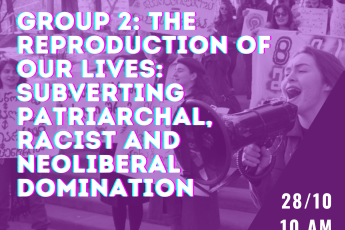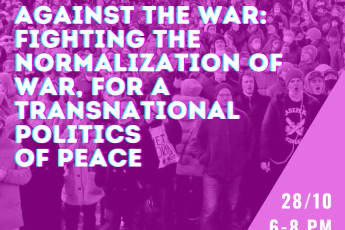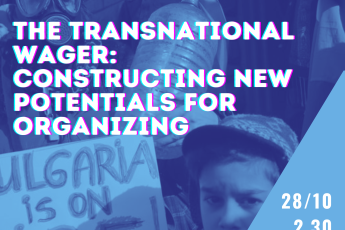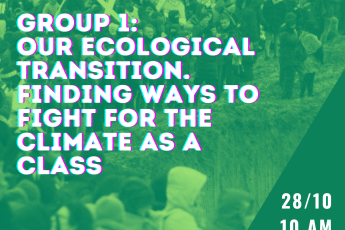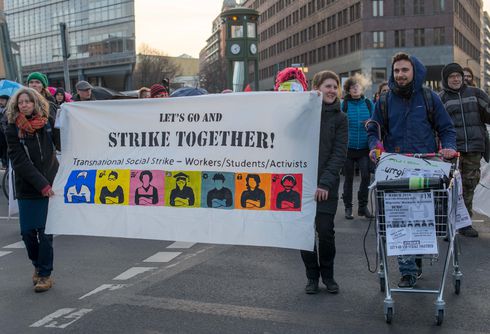
REPORT OF A DAY OF COORDINATED ACTIONS THROUGHOUT EUROPE
Have a look at the pictures and videos of the day on the transnational map:
The sense of something new, starting from migrants’ struggles
The 1st of March 2016 more than 20 cities in eight European countries mobilized in the action day called by the Transnational Social Strike Platform. Many different events, demonstrations, actions and assemblies took place with the aim of practically showing that it is possible to overcome hierarchies and divisions by being united against borders and precarization. The 1st of March has been powerful not so much for its numbers, but because one thing has been made clear: the process towards a transnational strike cannot but start politically from the migrants that in these months are challenging the European constitution, at its borders – in Idomeni as in Calais, along the Balkan route as at the Italian-Austrian border, in Lampedusa as in Denmark – and in the workplaces and society, where they are changing once and for all the existing composition of labor. To start from migrant labor does not mean just to show solidarity but to engage in a common struggle. Against the European government of mobility and the crisis regime, the 1st of March shows the possibility to overcome divisions by asking all together a European residence permit without conditions, along with a European minimum wage, welfare and basic income. This has lead many that were not part of the transnational social strike process to join us on the 1st of March.
A varied day, from Munich to Rome, from Edinburgh to Warsaw
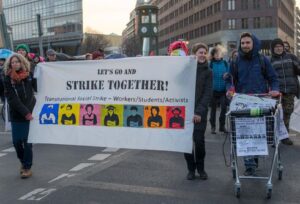
Many actions and demonstrations during the day have been able to address several sides of the current government of mobility that, attacking both internal and external migrants, operates in many ways: through fences and welfare cuts, through laws on asylum and the threat of expulsion, through cuts in wages, special economic zones and austerity policies. The streets of Munich have been occupied by Bulgarian migrants asking for housing and basic rights for all. Most of the protesters sleep rough in Munich. Nevertheless they work in the construction and cleaning sector, sometimes without papers. Often they have to struggle against wagetheft. The city thinks their precarization is their fault, according to the well known habits of institutional racism: they are EU-citizens, but they are denied even the most basic rights. In Berlin a strikers’ walk on the workers’ side, by Blockupy activists, unionists, internal migrants and students, behind the banner «let’s strike together» occupied the streets of «the city of mini-jobs and precarity», stopping in front of significant places of exploitation: the so called «mall of shame» where Romanian migrants were cheated out of their wages, the university offices and the ministry of finance. In Poznan, following the lead of a common statement of German and Polish Amazon workers denouncing the working conditions inside the warehouses and affirming the need of coordinating across borders, a sit-in was organized in front of Adecco, one of the main temp agencies hiring for Amazon. Temp agencies are handling workers as if they where commodities to be bought and then thrown away when they are not necessary anymore. In the case of migrants the agencies not only hire them but also gain the power to administer their residence permits and accommodation. During the action we could also hear the voices of workers who oppose the abuse of civil law contracts and outsourcing, especially in sectors such as art and culture, education, construction sector, work at a height, cleaning and cleaning services etc. In Edinburgh, the march in solidarity with migrants stopped also in front of Amazon offices, to say clearly that «temporary does not mean submissive!». Amazon workers took part also in the city walk organized in Frankfurt and gave speeches in front of the local branc of Adecco in solidarity with the polish colleagues.
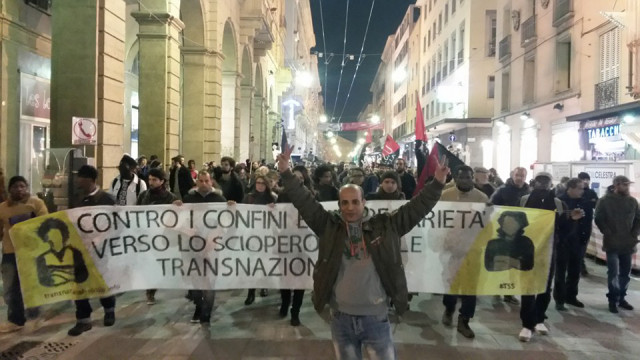
The protest and the following assembly was composed by refugees and migrant workers, by grassroot unionists and unemployed, who gathered to unite what borders and exploitation divide. In Warsaw a «Saint Precarious» procession brought in front of the Ministry of Labor and Social Policies the testimony of precarious, migrants and impoverished workers; in Paris and Dresden leaflets about the need of union organizing and striking on a transnational level were distributed. In Italy more than one thousand people took the streets: in Bologna migrants, refugees, precarious and industrial workers shouted loudly that precarious and migrant labor in all its forms – in the workplaces, at home, in the hospitals, in the agricultural fields – is part of the same system of exploitation. Migrants and precarious workers employed in the welcome industry in Rome said loud and clear, in front of the immigration offices and in the streets, that it is essential to connect our struggles in order to cause a real transformation and to build a powerful strike. One day before, in Foggia, the migrant agricultural workers asked to stop the slavish conditions in which they are forced to work, due to their bosses’ greed and exposed the silence of the institutions as one side of institutional racism. In Padua, a sit-in in front of the immigration office, on the cry of «let’s cross the struggles, let’s open the borders!», protested against the way in which residence permits and asylum requests are handled; in Cesena the migrants hired in the logistical firm «Artoni» demonstrated their opposition to the attacks on wages and freedom of association they suffered in the last months. Many other actions around the issue of migrant labor, refugees and precarity took place in Mantua, Benevento, Rimini, Naples, Brescia and Empoli. In Leiden, Lesbos and Ljubljana groups took part last minute to the call for a 1st of March organizing actions against border and precarization. While people in Vienna were discussing in an open assembly about the «Calais Jungle», activists from Stockholm brought inside the Ikea shop the watchword of the Transnational Social Strike, expressing the need to organize against the transnational chains of exploitation.
A long way ahead towards a transnational social strike
On the 1st of March migrants have made clear that they are not a marginal issue: they are at the center of the European stage. Their voice resonated in many corners of Europe together with the voices of many others, precarious, students, industrial workers and unemployed. From the richness of this day we gain a reassured belief in the fact that the way to fight against the borders that divide us is to build unprecedented connections and to experiment new forms of transnational struggle. This shift in discourse and practice is what we want to keep and learn from this experimental 1st of March.
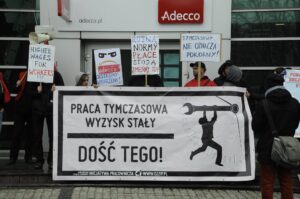
Nonetheless, we know that the Transnational Social Strike has still a long way ahead. We know that in order to build the conditions of possibility of a powerful transnational strike we need to overcome the borders between old and new forms of organization, for instance through the definition of common claims across different working conditions, groups and countries. The migrants’ storm, the disorder they are producing in an already unstable labor market challenges in depth the traditional forms of social activism and labor organization. While we try to deepen this disorder caused by migrants all around Europe, turning it at the advantage of migrants, precarious and industrial workers, we want to keep tackling the issue of organizing the unorganizable, of making a transnational social strike something real. We know that the right to strike and association is under attack in many countries of Europe. We know there are many ways to strike against the government of mobility and exploitation nowadays: the strike against the hierarchical nature of border control in Idomeni is a powerful example of how strike can spill over the domain of labour. We know that the migrants’ assault against the internal and external borders of Europe is at the moment the most significant form of strike against the new European order. We also know that we need to challenge the divisions between an abstract and a material right to strike: beyond the complain about the attack against trade unions and the right to strike, the transnational social strike cannot be a property of the few, but will need to go against every kind of division among workers.
Making it real: for building a large transnational social strike meeting
What we need is a practical guide towards a transnational social strike that is up to the current transformations of labor. We want to build it together with migrants, refugees, precarious and industry workers, activists and unionists. After the first of March, we know the transnational social strike process can open new possibilities and connections, starting from our local struggles. We will bring the perspective and the claims connected with the Transnational Social Strike in our daily activity, we will support the growth of new groups around this common project and we will foster transnational communication. We also believe that the transnational social strike is a concrete possibility for all groups and collectives that want to change the current Europe. We call everyone that wants to unite forces against the present situation to join us in building a large and open meeting. After the kick-off in Poznan and the experiment of the 1st of March, the meeting we have in mind wants to take a step further towards the construction of a collective «we» that can lead us closer to a transnational social strike. We want to do it involving all those that have participated in the 1st of March, all those that have watched at this day of action discovering for the first time the process towards a transnational social strike, all those that are looking for a new path to unite and empower our struggles.
We have no identity nor a past to defend, just an open process to storm the present.
Transnational Social Strike Platform


